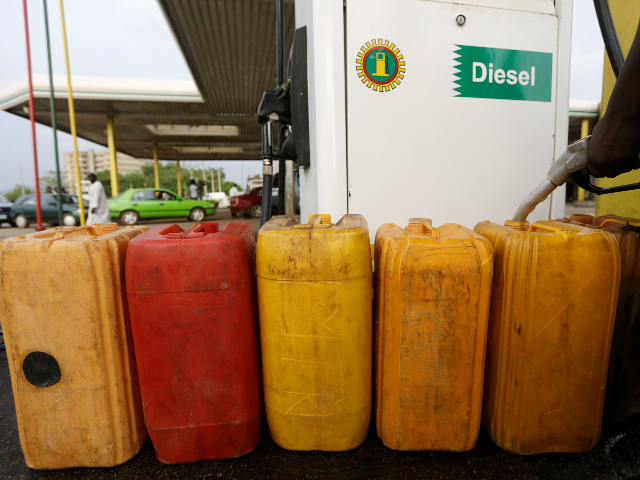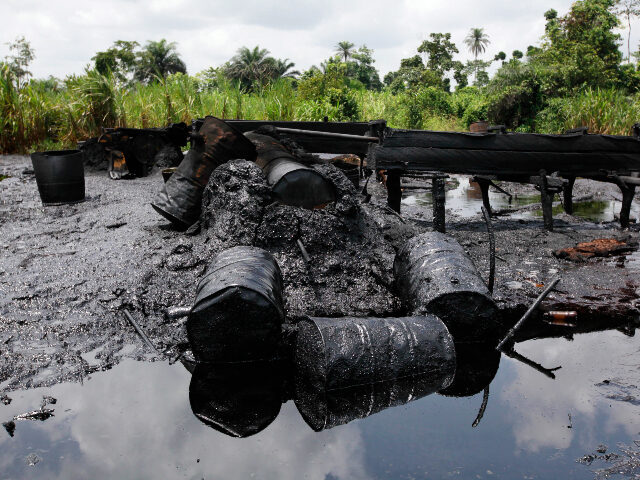The Nigerian military announced on Thursday that its anti-piracy operation destroyed 39 illegal oil refineries over the past two weeks, recovering large quantities of stolen oil along with vehicles and weapons used by the thieves.
Oil theft is a massive problem in Nigeria, whose pipelines run across large stretches of remote land where bandits can work undisturbed. In October, Nigeria’s state oil company NNPC discovered a sophisticated pirate pipeline that was over two and a half miles long, parasitically attached to an undersea export terminal. NNPC said another of its pipelines had 295 illegal taps sucking away the majority of its oil.
According to the NNPC, something like a third of Nigeria’s oil was stolen last year, costing the government $10 billion and leaving it without enough revenue to service its debt.
The Premium Times of Nigeria reported on a Thursday news briefing by military media operations director Musa Danmadami on the latest crackdown against oil thieves:
Mr Danmadami, a major general, said the troops in the conduct of Operation Octopus Grip and other operations destroyed 48 cooking ovens, 103 storage tanks, 27 dugout pits and 33 wooden boats during the period.
He said the troops also recovered one tug boat, a barge, three pumping machines, three-speed boats and 13 vehicles.
According to him, troops recovered 274,000 liters of crude oil, 71,000 liters of Automotive Gas Oil, and 15 Ak47 rifles, while 40 suspected economic saboteurs were arrested.
Danmadami said air crews were scouring the area around oil pipelines for “makeshift tents” employed by thieves to cover their taps and refineries, then calling in ground forces to make the arrests. In one incident, he said the military opened fire on a pirate crew, “and the locations were observed to have exploded in an inferno” as illegal refining equipment and munitions were destroyed.

FILE- In this Tuesday, May. 26, 2015 file photo, a man fills containers with diesel at the Nigeria National Petroleum Corporation, petrol station in Abuja, Nigeria. The Nigerian National Petroleum Corp. says it lost 267 billion naira ($1.3 billion) in 2015, even as it tried to pump more oil to counter slashed world prices. The corporation’s monthly report posted at its website Thursday , Feb. 4, 2016 shows the biggest losses recorded at its headquarters, by three refineries and a subsidiary that sources and distributes refined products. (AP Photo/Sunday Alamba file)
The government’s crackdown on oil theft began in earnest in October, with an encouraging early spate of arrests and illegal taps shut down.
The Nigerian military controversially hired a leading former oil thief named Government Ekpemupolo to guide its operations, trusting his knowledge of the pirate gangs and their methods would help them target his former comrades. Ekpemupolo, who uses the nickname “Tompolo,” said the biggest obstacle was that oil companies and corrupt military officials were colluding with the thieves to steal oil and protect thieves from prosecution.
Some of the oil thieves are profiteering gangs, some are feuding revolutionary militants, and some are impoverished local residents who feel they have never been properly compensated for the crude extracted from their ancestral lands. Citizen thieves prefer terms like “artisanal oil bunkering” for their activities.
Their mom-and-pop pipeline taps tend to be some of the sloppiest, most dangerous, and most environmentally damaging operations. The environmental fallout from oil theft is exacerbated by the often poor condition of Nigeria’s badly-designed and indifferently-maintained official pipelines.

COMMENTS
Please let us know if you're having issues with commenting.